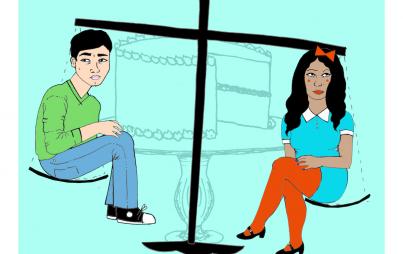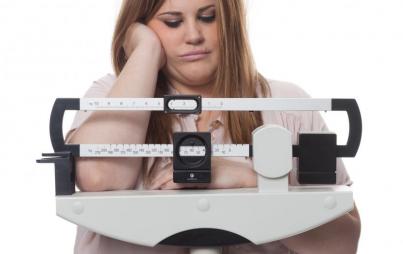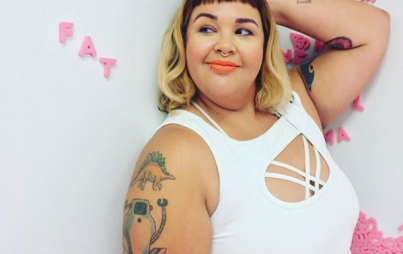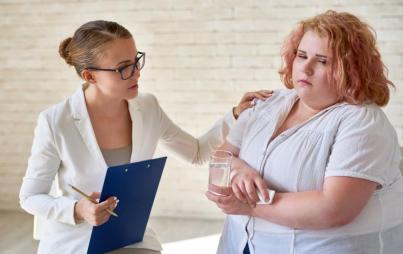
Watch your words.
And maybe eating disorders weren't covered in your med school classes. Maybe you skipped that cycle. Maybe it didn't interest you. Maybe. Whatever.
In my 28 years on this earth, I have learned three really important lessons: 1. Always buy toilet paper when you're at the store, no matter how much you have at home. 2. There's a fine line between taking things for granted and not enjoying them at all because of worrying they will come crashing down at any second. 3. Don't make assumptions. We all know it makes an ass out of you and me.
I made an assumption today. And for that, I want to apologize.
When I came into your office as a new patient, I assumed you would have spent 60 seconds reading over my medical records. I assumed you would wash your hands before you touched me. I assumed you would know how to speak to a human being.
I assumed wrong, and I spent the rest of my day paying for it. Very much my bad.
You are the 11th health professional that I have dealt with over the past two and a half years who doesn't know how to deal with an eating disorder patient. You are one of 11 nutritionists, therapists, and primary physicians who have either ignored the eating disorder, stuttered over the eating disorder, or told me to change my diet.
Because I made the assumption that you were an educated human being on women's health, seeing that you also do gynecological exams, I came into my appointment today feeling hopeful that perhaps you, Number Eleven, would finally be the doc to listen to my concerns, explain to me what is and is not normal, and order me some bloodwork or a blood sugar test or something. I am not a doctor, so I don't really know what you're supposed to do, so I also want to apologize for assuming that you would...know what you're supposed to do.
Over 30 million people in this country, 2/3 of them women, suffer from an eating disorder. Anorexia nervosa, bulimia nervosa, binge-eating disorder, orthorexia, or EDNOS (Eating Disorder Not Otherwise Specified). See, in my head you already knew that, but just in case.). They affect thirty. million. people. That's just in the United States.
And maybe eating disorders weren't covered in your med school classes. Maybe you skipped that cycle. Maybe it didn't interest you. Maybe. Whatever.
But from what I understand, as a primary care physician, you kind of have to know it all.
I know that sucks, and I know you have to know a lot of stuff, like I can't even imagine how you remember all the bones and the things and the veins and the names but, as a patient with a medical issue that has affected my life for over a decade, I need you to know things. Sorry 'bout your nuggets. It's what I'm paying for when I dish out $10,000 a month on health insurance that doesn't cover a pap smear more than every three years.
I'm sorry that you have to know so many things, and I'm sorry that one of those things is the wording that is needed to deal with an eating disorder patient.
For instance, what happened today, in your office, is not the wording a doctor is supposed to use in a meeting with an eating disorder patient. And it's definitely not the wording to use with a new eating disorder patient.
You: So, heart disease runs in your family?
Me: Yes. And I'm in recovery for an eating disorder, so I've gained about 60 pounds in the last two years. But I dance four to five hours a day, so I'm wondering if that all makes sense and if I should have some blood work done.
You: OK, well, has your diet changed?
Me: Well, yes. I'm eating. And I didn't used to.
You: Well, yes, we can see that. OK. I'll order some labs.
OK, so first, I'm going to explain to you why this conversation is not acceptable. And then, I'm going to apologize for not explaining it to you in person, in the room, before I left in a huff and wrote about you on the Internet.
When speaking with someone with a history of disordered eating, there are several ways to inquire about what the person eats now. First, asking how the recovery is going is a start. Considering you didn't look at my medical records before you came in the room, asking me what kind of eating disorder I was diagnosed with and how long it had been going on, is also a great question to ask. Then, if you're curious about what I eat on a daily basis, perhaps you could ask me, What do you find yourself eating these days? or How is your relationship with food now? These questions could then in turn lead to questions like, How do you like to take care of your body now? or How do you feel in your own skin right now?
Before you explain to me that my appointment was only to be a half-hour and you're not a counselor, let me stop you and ask you to ponder if these questions are really only for a counselor or therapist to ask. If I am coming to you with concerns around my weight gain and the history of heart disease in my family, don't these questions pertain to the sort of tests you might need to order for me? Furthermore, don't these questions help you figure out where I am in my recovery, or if I'm really in recovery at all? How many patients lie to their doctors because they aren't ready to head into battle with their eating disorder? Do you not feel alarmed when someone says they are in eating disorder recovery? Do you not feel that more information would help you better serve your patient?
Again, I do apologize for making so many assumptions about how you should do your job. I realize you are a busy woman, and my small victories in the last two years do not concern you — nor did my medical file, or even my name, really.
But my biggest apology is for what I didn't do after you told me you could “see” that I've been eating — whatever that means, considering I was sitting down, in a maxi dress, and you couldn't see any part of my body other than my arms.
Weighing in at 202 today, and telling you that I do about four to five hours of physical activity six days a week, has certainly caused concern for me. I had questions. Questions like, Do I have a metabolism? and, Are my arteries clogged with coconut oil? Because I don't really eat that much butter, so what is happening inside my body? Questions like, What could I be doing differently? and Should I be concerned at age 28 that I will have high cholesterol after doing so much damage to my body for the past 10 years? Questions like, Can you help me, or could you direct me to someone who can?
Instead, you told me that you could “see” that I am eating, and then told me that you would order some labs, and then left the room without shaking my hand.
And for that, I am truly sorry.
Because had I not been so shocked when you told me you could “see” that I was eating, after you asked me about my diet, after you only asked me about my diet but didn't ask me about my eating disorder, my recovery, or my medical history, I would have explained to you how to do your job differently. How to do your job better. Just, really, how to do your job.
If you are going to work with women, then you, and every other doctor, nutritionist, and therapist should be aware of the body image war going on in this world, the eating disorder epidemic going on in this world, and the rate at which young girls are growing up and entering both. You should have been taught this when you were in school, but if you weren't, then you should know to read an article or a book or watch a YouTube clip every now and then about what the fuck is going on. I'm sorry that I'm telling you what you should do, because it's not my place. But you should do it anyway. You have probably encountered more women with an undiagnosed eating disorder in your career than you've actually noticed, and you're not doing anyone any favors by asking them what their diet is and then handing them a brochure about eating less bacon. In case you want to start your research right away, here is a massive index of resources for you to read and use with your patients that have nothing to do with bacon.
I'm sorry, and I truly am the most sorry for this one, but you have an obligation. And we, as the 20 million women and 10 million men who suffer from an eating disorder in this country, expect you to uphold that obligation.
Show up to work. Know your shit. Watch your words. Use a filter when words come out of your mouth. Show a little compassion. Wash your hands. Know people's names. Look at their medical records. And pay attention to cause for concern.
I'm sorry that I didn't take the time to educate you today in our appointment. As you reminded me three separate times, we only had 30 minutes, and the shock that I felt after you used such inappropriate language around my eating disorder took up all the time I had left. And I just couldn't fathom getting any other words out.
It's my bad that I didn't wake you up with some facts or complain to your superiors before I got to my car and lost my shit. It's my bad that I had to call them afterward and try to explain what had happened while not really being able to articulate through my anger. It's my bad that I walked out of that office without explaining to you how unprofessional, unhelpful, and uneducated you were.
And above all, it's my bad for assuming that you would walk into my patient room being all those things and more.
I'm sorry that you haven't opened your eyes to this mental illness epidemic that's sweeping this country and taking millions of little girls, grown women, and men of all ages under its horrible, chaotic wing.
And I'm sorry that, while I had the chance, I wasn't able to come up with the words to explain it.
I truly hope you'll forgive me, but considering you entered the room not even knowing who I was, I think you'll get on just fine.
Sincerely,
A Patient Who Needed Your Help Today
If you or someone you love is struggling with an eating disorder, you must seek professional help. This piece is in no way a recommendation that anyone should avoid medical care and counseling. Talk to your physician and use helpful tips from here and here to help you through your appointment. Your physician can recommend outpatient care, counseling, or refer you to another physician who can answer more of your questions. Not all doctors and counselors are bad. I just seem to be having a really long, unlucky streak. I also live on a lava rock in the middle of the ocean, and have less access than those on the mainland. No one should feel scared of seeking help. Take someone with you, and together you can decide if you need a second opinion or to switch doctors entirely. I promise to keep fighting for us, and do my best to educate those who I have uneducated encounters with, if you promise to take care of yourself and seek help for what you need. Together, we fight. For us.
Excellent resources to help you through eating disorder struggles:
National Eating Disorders Association: Helpful tips and information about eating disorders
Renfrew Center: Offering outpatient and inpatient counseling and care, excellent reading list
Anorexia Nervosa and Associated Disorders: Helpline, information, support groups, and more
Binge Eating Disorder Association: For more information specific to Binge Eating Disorder
Geneen Roth also saved my life. Her books are worth checking out in regards to emotional eating, binge-eating, and addiction.
You are not alone. There is help out there. I promise.








